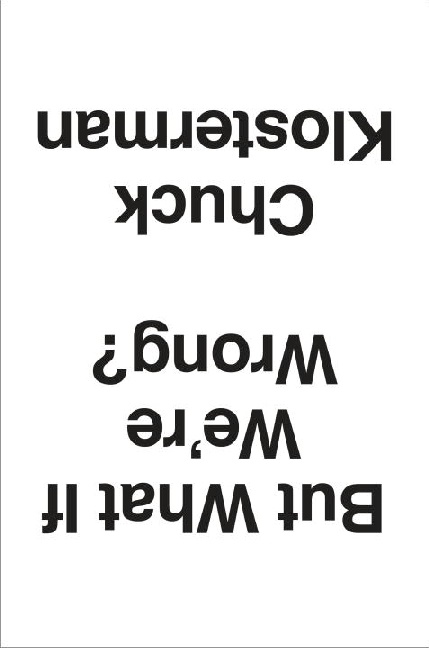Mehr lesen
Zusatztext 47860628 Informationen zum Autor Chuck Klosterman is the bestselling author of eight nonfiction books (including Sex! Drugs! and Cocoa Puffs ; I Wear the Black Hat ; But What If We're Wrong? ; and Killing Yourself to Live ) and two novels ( Downtown Owl and The Visible Man ). He has written for The New York Times ! The Washington Post ! GQ ! Esquire ! Spin ! The Guardian ! The Believer ! Billboard ! The A.V. Club ! and ESPN. Klosterman served as the Ethicist for The New York Times Magazine for three years! appeared as himself in the LCD Soundsystem documentary Shut Up and Play the Hits ! and was an original founder of the website Grantland with Bill Simmons. Klappentext The tremendously well-received New York Times bestseller by cultural critic Chuck Klosterman! exploring the possibility that our currently held beliefs and assumptions about the world will eventually be proven wrong -- now in paperback. But What If We're Wrong? is a book of original! reported! interconnected pieces! which speculate on the likelihood that many universally accepted! deeply ingrained cultural and scientific beliefs will someday seem absurd. Covering a spectrum of objective and subjective topics! the book attempts to visualize present-day society the way it will be viewed in a distant future. Klosterman cites original interviews with a wide variety of thinkers and experts -- including George Saunders! David Byrne! Jonathan Lethem! Alex Ross! Kathryn Schulz! Neil deGrasse Tyson! Brian Greene! Junot Díaz! Amanda Petrusich! Ryan Adams! Dan Carlin! Nick Bostrom! and Richard Linklater. Klosterman asks straightforward questions that are profound in their simplicity! and the answers he explores and integrates with his own analysis generate the most thought-provoking and propulsive book of his career. ***This excerpt is from an advance uncorrected proof*** Copyright ©2016 Chuck Klosterman I’ve spent most of my life being wrong. Not about everything. Just about most things. I mean, sometimes I get stuff right. I married the right person. I’ve never purchased life insurance as an investment. The first time undrafted free agent Tony Romo led a touchdown drive against the Giants on Monday Night Football , I told my roommate, “I think this guy will have a decent career.” At a New Year’s Eve party in 2008, I predicted Michael Jackson would unexpectedly die within the next twelve months, an anecdote I shall casually recount at every New Year’s party I’ll ever attend for the rest of my life. But these are the exceptions. It is far, far easier for me to catalog the various things I’ve been wrong about: My insistence that I would never own a cell phone. The time I wagered $100—against $1—that Barack Obama would never become president (or even receive the Democratic nomination). My three-week obsession over the looming Y2K crisis, prompting me to hide bundles of cash, bottled water, and Oreo cookies throughout my one- bedroom apartment. At this point, my wrongness doesn’t even surprise me. I almost anticipate it. Whenever people tell me I’m wrong about something, I might disagree with them in conversation, but—in my mind—I assume their accusation is justified, even when I’m relatively certain they’re wrong, too. Yet these failures are small potatoes. These micro-moments of wrongness are personal: I assumed the answer to something was “A,” but the true answer was “B” or “C” or “D.” Reasonable parties can disagree on the unknowable, and the passage of time slowly proves one party to be slightly more reasonable than the other. The stakes are low. If I’m wrong about something specific, it’s (usually) my own fault, and someone else is (usually, but not totally) right. But what about the things we’re all wrong about? What...

